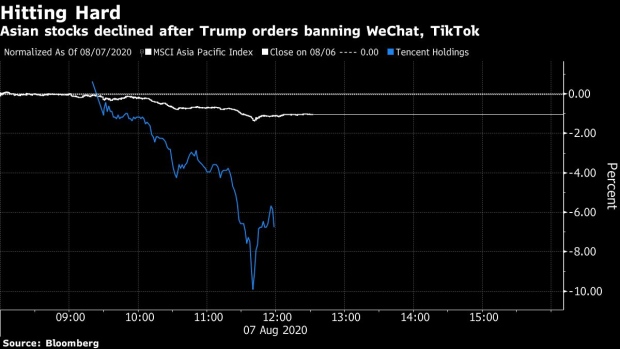Aug 7, 2020
Traders Prepare for More Swings From Rising U.S.-China Tensions
, Bloomberg News

(Bloomberg) -- U.S. President Donald Trump’s move to ban WeChat and TikTok just sent a shock wave across Asian markets and hit some of the most loved tech stocks in the region.
Shares of WeChat operator Tencent Holdings Ltd. plunged as much as 10%. Other tech names such as Alibaba Group Holding Ltd. and Samsung Electronics Co. also showed up as the big decliners in Asia on Friday. The MSCI Asia Pacific Index turned lower to fall as much as 1.4%, snapping a four-day gaining streak.
“There’s no saying how bad things could get. We don’t know where the negative headlines could end. Today it could be social media, tomorrow it could be Baidu or some other company,” said Hao Hong, chief strategist at Bocom International. “It could be even banks that come next further down the line.”
Here’s a selection of comments from strategists and investors:
What’s Next for Tencent?
The ban on WeChat may not be the only blow to Tencent, said Steven Leung, UOB Kay Hian executive director.
“After signing of the executive order, the U.S. government will follow up with more measures targeting Tencent,” he said. “More negative headlines will come out and could potentially further hurt sentiment toward Tencent, as well as the overall market.”
This makes Tencent’s overseas expansion plans uncertain, and investors will be scrutinizing the firm’s earnings to come next week, Leung said.
“Some M&A deals, especially if its targets are based in the U.S., will face challenges,” he said. “The market has already priced in an upside surprise in its earnings due next week, so the key focus now is the third-quarter guidance and how much the U.S. ban would hurt the company.”
Silver Lining for Hong Kong?
One possible beneficiary of the increasing U.S.-China tension is Hong Kong’s stock exchange, said Patrick Shum, director of investment management at Tengard Holdings.
“The news is favorable to Hong Kong’s stock market in the long term as more Chinese companies will choose to list in Hong Kong over the U.S. for lower regulatory risks,” Shum said.
Psychological Impact
Given the limited U.S. revenue generated by Tencent and ByteDance, the key concern is how the Chinese government responds to this latest escalation, said Nelson Yan, head of offshore capital markets investment product at CreditEase Wealth Management (Hong Kong) Ltd.
“This may have a much larger impact politically and economically,” Yan said. “I think that would create uncertainties psychologically rather than material impact to those IT companies like Tencent, in fact those companies have limited revenue generated from the U.S.”
©2020 Bloomberg L.P.